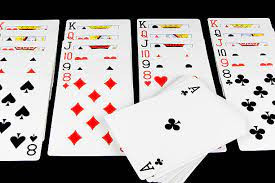
Solitaire, also known as Patience, is a timeless card game that has captivated players for generations. It's a solitary pursuit that offers both relaxation and mental stimulation. While many view Solitaire as a simple game, it has a depth and complexity that has made it a favorite pastime for countless individuals worldwide. In this article, we will explore the intriguing world of Solitaire Masters, delving into its history, rules, strategies, and the enduring appeal that has kept it a cherished card game for so long.
The Origins of SolitaireThe exact origins of Solitaire are shrouded in the mists of time, making it challenging to pinpoint its exact birthplace. However, it is generally believed to have originated in France during the 18th century, where it was initially known as "Le Patience." The name "Solitaire" itself is derived from the French word "solitair," which means "alone" or "solitary," reflecting the game's single-player nature.
Read Also: http://www.solitaire-masters.com
Solitaire found its way to North America in the late 18th century, thanks to French colonists, and quickly gained popularity. Over the years, it underwent various adaptations and rule modifications in different regions, giving rise to numerous Solitaire variants. By the 19th century, Solitaire had become a prominent feature in books and publications, securing its position as a universally recognized card game.
The Standard Rules of SolitaireWhile Solitaire boasts numerous variations, the most commonly played version uses a standard 52-card deck. The game's primary objective is to move all the cards to a foundation pile according to a specific sequence and set of rules. Here's a concise overview of the standard rules:
- Setting up the game: Begin by shuffling the deck and dealing 28 cards into seven columns. The first column contains one card, the second two cards (one face down and one face up), and so forth. The remaining cards constitute the draw pile.
- Building the foundation: You establish the foundation by placing Aces in ascending order, starting with the Ace of Hearts, followed by the Ace of Diamonds, Ace of Clubs, and Ace of Spades. Foundations are built up by suit (e.g., 2 of Hearts, 3 of Hearts, 4 of Hearts, and so on).
- Moving cards within the columns: Cards within the columns can be moved in descending order and must alternate colors. For example, you can place a black 10 on a red Jack.
- Revealing hidden cards: When a face-down card is exposed by moving the cards on top of it, you can flip it face-up and use it in your game.
- Drawing cards from the deck: If you reach a point where you cannot make any more moves within the current layout, you may draw one card at a time from the draw pile, attempting to incorporate it into your columns or foundations.
- Winning the game: Solitaire is won when all cards are successfully moved to the foundation piles, following the ascending order and by suit.
Solitaire may appear to be a game of chance, but seasoned players know that strategy plays a crucial role in achieving victory. Here are some strategies that can enhance your Solitaire prowess:
- Plan ahead: Before making any move, take a moment to survey the entire tableau and foundation piles. Look for opportunities to sequence cards onto the foundation piles and expose face-down cards in the columns.
- Prioritize foundation cards: Always prioritize moving cards to the foundation when possible. Building up the foundations early in the game can provide more space in the columns and open up additional strategic options.
- Uncover hidden cards: Focus on revealing face-down cards in the columns. Creating space and uncovering potential key cards is essential to advancing in the game.
- Empty columns strategically: If possible, aim to empty columns early in the game. An empty column provides space for maneuvering and can be used to temporarily store cards as you work towards completing the foundations.
- Don't rush the draw pile: Be patient when drawing cards from the deck. Rushing through the draw pile can lead to missed opportunities and potential dead ends.
- Undo moves wisely: Many Solitaire computer programs offer an "undo" option. Use it thoughtfully to explore different paths without penalizing yourself for mistakes.
What is it about Solitaire that has made it a beloved classic for centuries? The enduring popularity of Solitaire can be attributed to several factors:
- Mavhunga puts DeMbare into Chibuku quarterfinals
- Ndiraya concerned as goals dry up
- DeMbare’s double boost
- ‘Zifa suspension won’t affect player transfers’
Keep Reading
- Accessibility: Solitaire requires only a standard deck of cards, making it easily accessible to anyone with a deck on hand. It can be played virtually anywhere, from the comfort of your home to a coffee shop or airport.
- Solo play: Solitaire offers a unique form of entertainment where you can enjoy the game at your own pace, without the need for opponents or partners. It's a perfect pastime for moments of solitude and reflection.
- Mental stimulation: While Solitaire can be relaxing, it also engages your mind. Players must strategize, plan ahead, and make decisions that impact the outcome of the game. This mental challenge keeps players coming back for more.
- Stress relief: Solitaire's repetitive and orderly nature can be soothing and act as a stress reliever. It provides a sense of control and accomplishment as you work toward a goal.
- Timeless appeal: Solitaire's simplicity and elegance have allowed it to transcend generations and cultures. Its enduring charm makes it a game that can be enjoyed by people of all ages.
Solitaire Masters, also known as Patience, is a card game that has stood the test of time. Its origins may be shrouded in mystery, but its enduring popularity is no mystery at all. Solitaire offers a unique blend of relaxation, mental stimulation, and accessibility that makes it a favorite pastime for individuals around the world. With its straightforward rules and strategies, Solitaire remains an engaging and enjoyable card game that continues to captivate players young and old. Whether you're a seasoned Solitaire veteran or a newcomer to the game, there's always a new challenge to tackle and a victory to savor in the world of Solitaire Masters.









